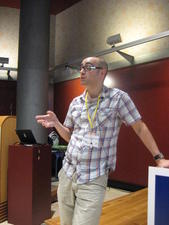Gran Canaria Desktop Summit: Akonadi for the Integrated Desktop
The Cross-Desktop Metadata track at this year's Gran Canaria Summit highlighted developer activity targeting central storage of contact data, email and other personal information.
Will Stephenson, responsible for Personal Information Management (PIM) software at Novell, introduced Akonadi, a service that centrally stores contacts, emails, IM entries and much more. Akonadi should replace the individual data storage of various applications, which were designed over the last 10 years to accommodate small, local data volumes, said Stephenson. Akonadi should provide one service with a unified API that scales well and is extensible to new data types as they emerge.
The large KMail and KOrganizer applications are currently undergoing refactoring to make them Akonadi-compliant. The Akregator RSS reader, the KPilot handheld tool and the KNode news reader are also in the works, reported Stephenson. KAddressBook will be reimplemented as codename KContactManager. At the conference, Stephenson invited developers to submit new interfaces for Akonadi.
To demonstrate just such an interface, Austrian KDE developer Kevin Krammer followed up in the next half-hour session by programming, partly with help from the audience, a simple Akonadi resource for read-only access.

Comments
comments powered by DisqusSubscribe to our Linux Newsletters
Find Linux and Open Source Jobs
Subscribe to our ADMIN Newsletters
Support Our Work
Linux Magazine content is made possible with support from readers like you. Please consider contributing when you’ve found an article to be beneficial.

News
-
Chaos Comes to KDE in KaOS
KaOS devs are making a major change to the distribution, and it all comes down to one system.
-
New Linux Botnet Discovered
The SSHStalker botnet uses IRC C2 to control systems via legacy Linux kernel exploits.
-
The Next Linux Kernel Turns 7.0
Linus Torvalds has announced that after Linux kernel 6.19, we'll finally reach the 7.0 iteration stage.
-
Linux From Scratch Drops SysVinit Support
LFS will no longer support SysVinit.
-
LibreOffice 26.2 Now Available
With new features, improvements, and bug fixes, LibreOffice 26.2 delivers a modern, polished office suite without compromise.
-
Linux Kernel Project Releases Project Continuity Document
What happens to Linux when there's no Linus? It's a question many of us have asked over the years, and it seems it's also on the minds of the Linux kernel project.
-
Mecha Systems Introduces Linux Handheld
Mecha Systems has revealed its Mecha Comet, a new handheld computer powered by – you guessed it – Linux.
-
MX Linux 25.1 Features Dual Init System ISO
The latest release of MX Linux caters to lovers of two different init systems and even offers instructions on how to transition.
-
Photoshop on Linux?
A developer has patched Wine so that it'll run specific versions of Photoshop that depend on Adobe Creative Cloud.
-
Linux Mint 22.3 Now Available with New Tools
Linux Mint 22.3 has been released with a pair of new tools for system admins and some pretty cool new features.

Re: e-d-s
Both are services running in the user's session (as opposed to running once per machine) and provide a central point of access for data.
Akonadi has been designed to work with all kinds of data, i.e. not restricted to contacts and calendar, but also e-mail, RSS feeds, bookmarks, news groups, etc.
Another difference is that Akonadi's data providers or backends (called Akonadi resource agents or Resources) are running in separate processes, thus shielding the Akonadi service from failure on their parts. If one Resource crashes, none of the other Resources nor Akonadi nor any of the applications are affected.
It basically also opens the way for implementing resources in any programming language or using any library stack because they don't have to be loaded into Akonadi as some kind of compatible plugin.
e-d-s